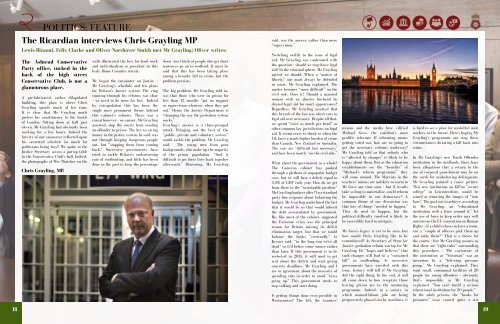The Future of Britain
Create successful ePaper yourself
Turn your PDF publications into a flip-book with our unique Google optimized e-Paper software.
POLITICS: FEATURE<br />
<strong>The</strong> Ricardian interviews Chris Grayling MP<br />
Lewis Bizaoui, Felix Clarke and Oliver Northover Smith met Mr Grayling; Oliver writes:<br />
<strong>The</strong> Ashtead Conservative<br />
Party <strong>of</strong>fice, tucked in the<br />
back <strong>of</strong> the high street<br />
Conservative Club, is not a<br />
glamourous place.<br />
A pre-fabricated, rather dilapidated<br />
building, this place is where Chris<br />
Grayling spends much <strong>of</strong> his time.<br />
It is clear that Mr Grayling much<br />
prefers his constituency to the bustle<br />
<strong>of</strong> London. Sitting down at half past<br />
eleven, Mr Grayling had obviously been<br />
working for a few hours. Indeed the<br />
brevity <strong>of</strong> our encounter reflected upon<br />
his saturated schedule (so much for<br />
politicians being lazy!) We spoke to the<br />
Justice Secretary across a put-up table<br />
in the Conservative Club’s hall. Indeed,<br />
the photographs <strong>of</strong> Mrs Thatcher on the<br />
Chris Grayling, MP.<br />
walls illustrated the love for hard work<br />
and individualism so prevalent in this<br />
leafy, Home Counties retreat.<br />
We began the encounter on Justice –<br />
Mr Grayling’s schedule and his plans<br />
for <strong>Britain</strong>’s Justice system. <strong>The</strong> ring<br />
running through his reforms was clear<br />
– we need to do more for less. Indeed<br />
by extrapolation this has been the<br />
single most prominent theme behind<br />
this cabinet’s reforms. <strong>The</strong>re was a<br />
caveat however – we cannot, Mr Grayling<br />
asserted, stop the courts from sending<br />
an <strong>of</strong>fender to prison. <strong>The</strong> key to saving<br />
money in the justice system, he said, was<br />
not through keeping dangerous people<br />
out, but “stopping them from coming<br />
back.” Successive governments have<br />
tried to tackle <strong>Britain</strong>’s embarrassing<br />
rate <strong>of</strong> re<strong>of</strong>fending, and little has been<br />
done in the past to keep the percentage<br />
down –two thirds <strong>of</strong> people who get short<br />
sentences go on to re<strong>of</strong>fend. It must be<br />
said that this has been taking place<br />
among a broader fall in crime, but the<br />
problem persists.<br />
<strong>The</strong> big problem, Mr Grayling told us,<br />
was that those who were in prison for<br />
less than 12 months “got no support<br />
or supervision whatever when they got<br />
out.” Hence the Justice Department is<br />
“changing the way the probation system<br />
works.”<br />
Grayling’s answer is a three-pronged<br />
attack. Bringing out the best <strong>of</strong> the<br />
“public, private and voluntary sectors”<br />
would tackle the problem, Mr Grayling<br />
said. <strong>The</strong> young men from poor<br />
backgrounds, who make up the majority<br />
<strong>of</strong> the prison population, “find it<br />
difficult to get their lives back together<br />
afterwards.” Mentoring, Mr Grayling<br />
said, was the answer, rather than mere<br />
“supervision.”<br />
Switching swiftly to the issue <strong>of</strong> legal<br />
aid, Mr Grayling was confronted with<br />
the question – should we ring-fence legal<br />
aid? In the criminal sphere, Mr Grayling<br />
agreed we should. When a “matter <strong>of</strong><br />
liberty,” one must always be defended<br />
in court, Mr Grayling explained. <strong>The</strong><br />
matter becomes “more difficult” on the<br />
civil side. Does it? Should a married<br />
woman with an abusive husband be<br />
denied legal aid for court appearances?<br />
Regardless, Mr Grayling asserted that<br />
this branch <strong>of</strong> the law was where cuts to<br />
legal aid were necessary. Despite all that,<br />
we spend “twice as much per head” as<br />
other common law jurisdictions on legal<br />
aid. It seems crazy to think so when the<br />
UK faces a much higher burden <strong>of</strong> crime<br />
than Canada, New Zealand or Australia.<br />
<strong>The</strong> cuts are “difficult but necessary,”<br />
and have been mostly “on the civil side.”<br />
What about the government as a whole?<br />
<strong>The</strong> Cameron cabinet has pushed<br />
through a plethora <strong>of</strong> unpopular budget<br />
cuts, but we still have a deficit equal to<br />
5.4% <strong>of</strong> GDP each year. How do we get<br />
from there to the “sustainable position”<br />
Mr Grayling hankers after? In a standard<br />
party-line response about balancing the<br />
budget, Mr Grayling underlined the fact<br />
that it would be us that would inherit<br />
the debt accumulated by government.<br />
He, like most <strong>of</strong> the cabinet, suggested<br />
the Eurozone crisis was the principal<br />
reason for <strong>Britain</strong> missing its deficit<br />
elimination target, but that we would<br />
balance the books “eventually.” As<br />
Keynes said, “in the long run we’re all<br />
dead” so it’d better come sooner rather<br />
than later. If this government is to be<br />
reelected in 2015, it will need to get<br />
real about the deficit and start giving<br />
concrete deadlines. Mr Grayling and I<br />
are in agreement about the necessity <strong>of</strong><br />
spending cuts in order to avoid “taxes<br />
going up.” This government needs to<br />
stop talking and start doing.<br />
Is getting things done even possible in<br />
Westminster? <strong>The</strong> left, the teachers’<br />
unions and the media have vilified<br />
Michael Gove, the coalition’s most<br />
prolific reformer. If reforming means<br />
getting voted out, how are we going to<br />
get the necessary reforms underway?<br />
Mr Grayling told us that nobody who<br />
is “affected by changes” is likely to be<br />
happy about them. But as the education<br />
establishments see the “benefits” <strong>of</strong><br />
“Michael’s reform programme” they<br />
will come around. <strong>The</strong> Marxists in the<br />
teachers’ unions are unlikely to warm to<br />
Mr Gove any time soon – but if results<br />
take so long to materialise, could reform<br />
be impossible in our democracy? A<br />
common theme <strong>of</strong> our discussion was<br />
that lots <strong>of</strong> things “needed to happen.”<br />
<strong>The</strong>y do need to happen, but the<br />
political difficulty involved is likely to<br />
be incredibly hard to mitigate.<br />
Mr Gove’s legacy is yet to be seen, but<br />
how would Chris Grayling like to be<br />
remembered? As Secretary <strong>of</strong> State for<br />
Justice, probation reform was top for Mr<br />
Grayling. He “hopes and believes” that<br />
such changes will lead to a “sustained<br />
fall” in re<strong>of</strong>fending. As successive<br />
governments have wrestled with this<br />
issue, history will tell if Mr Grayling<br />
did the right thing. In the end, it will<br />
all come down to how receptive those<br />
leaving prison are to the mentoring<br />
programme. Indeed, in a society in<br />
which manual-labour jobs are being<br />
progressively phased out by machines, it<br />
is hard to see a place for unskilled male<br />
workers in the future. Here’s hoping Mr<br />
Grayling’s programme can stop these<br />
circumstances dictating a fall back into<br />
crime.<br />
In Mr Grayling’s new Youth Offender<br />
institution in the midlands, there have<br />
been allegations that a return to the<br />
use <strong>of</strong> corporal punishment may be on<br />
the cards for misbehaving delinquents.<br />
Mr Grayling painted a rosier picture.<br />
This new institution, an £85m “secure<br />
college” in Leicestershire, would be<br />
aimed at removing the images <strong>of</strong> “iron<br />
bars.” <strong>The</strong> goal was to achieve, according<br />
to Mr Grayling, an “educational<br />
institution with a fence around it.” Yet<br />
the use <strong>of</strong> force to keep order may well<br />
contravene the EU convention on Human<br />
Rights – if a child refuses to leave a room,<br />
can a “couple <strong>of</strong> <strong>of</strong>ficers pick them up<br />
and make them?” That is a choice for<br />
the courts – but Mr Grayling assures us<br />
that there are “tight rules” surrounding<br />
this procedure. <strong>The</strong> caricature <strong>of</strong><br />
the institution as “Victorian” was an<br />
invention by a “left-wing pressure<br />
group,” Mr Grayling explained. <strong>The</strong>y<br />
want small, communal facilities <strong>of</strong> 20<br />
people for young <strong>of</strong>fenders – obviously<br />
that’s impossible, as Mr Grayling<br />
explained. “You can’t build a serious<br />
educational institution for 20 people.”<br />
In the adult prisons, the “books for<br />
prisoners” issue caused quite a stir<br />
18<br />
19




